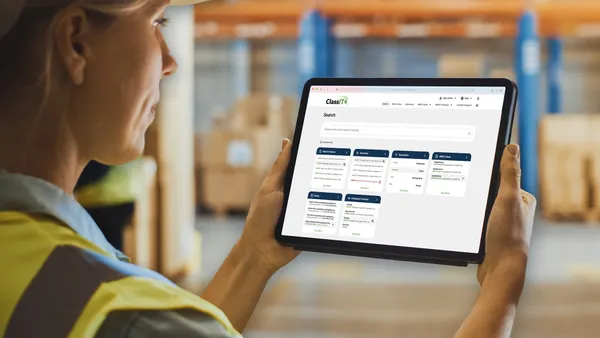Correction: A previous version of this article stated Ford purchased Argo AI. The headline and Dive Brief section have been modified to more accurately reflect Ford's investment in the startup.
Dive Brief:
- To meet its stated goal of producing driverless cars by 2021, the Ford Motor Company invested $1 billion over five years in robotics startup Argo AI, ABC News reported last week.
- The investment makes Ford a majority stakeholder in the startup, and also provides the company two of five board seats. Argo AI will retain two board seats, while an independent director will fill the fifth seat. Argo AI's employees will also receive stock as a portion of pay.
- Argo's founders, Bryan Salesky and Peter Rander, came together as veterans of both Uber and Google's Waymo self-driving teams, and created Argo AI to work on self-driving vehicle technology, according to a Medium post by the founders.
Dive Insight:
Despite the competition between automakers regarding which can most quickly bring a driverless product to market, the automakers are largely pursuing different strategies, including varying levels and degrees of autonomy.
In December, Ford announced its intention to begin testing autonomous prototypes in 2017, increasing its tryout-fleet to 90 vehicles. Unlike Volvo, which is proceeding cautiously with its addition of highway-only autonomy, Ford plans to rocket directly to what the Society of Automotive Engineers’ (SAE) call Level Four autonomy, or “High Automation,” in which human drivers do not engage with the autonomous vehicles. However, such cars will not be immediately available for sale; rather they will debut in taxi-like situations. While Ford is choosing Level Four, others are focusing on Level Three, which engages autonomy as the driver's choice.
In addition, with ride-hailing in view, Ford has targeted enhancing the vehicle's responsiveness to passengers, such as taking action on forgotten items or closing a passenger door if left open after the rider's departure. A look back at Ford's partnership with Blackberry shows the company's focus on connectivity, above all.
Perhaps it's a bid to differentiate itself in the case it cannot be the first to bring automated cars to market. ABC News reports the acquisition of Argo may have reflected an internal recognition of the need for talent and a perception it is behind in the race. Compared to the 0.2 rate of disengagements (system malfunctions) per thousand miles traveled by Google's Waymo, where the Argo founders used to work, Ford recorded a rate of 1.8 in California.
Regardless, the increasing intensity of the race for self-driving cars shows they may soon be in the market ... and could even extend to the logistics market. While trucks without steering wheels are unlikely, level three vehicles may reach adoption, as suggested by Uber's Otto. Only time and continued safety reports will tell whether the market will adjust to the new technology, but the automakers are betting it will.













